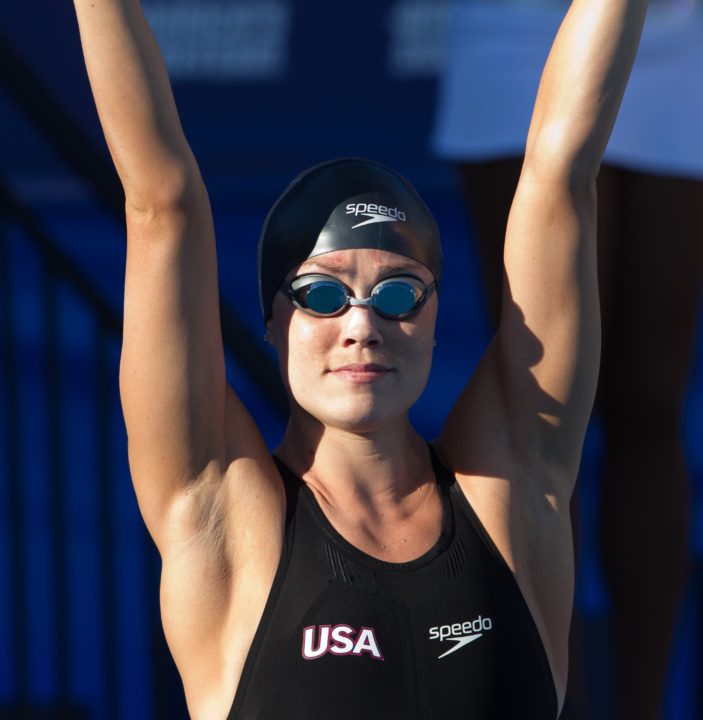Stretching for Race Recovery
Stretching does much more than elongate tight muscles. During competitions, stretching can be a particularly useful way to accelerate post-race recovery and improve pre-race warm ups with minimal exertion. Performing dynamic stretches prior to warm up and static stretches following warm down will help your body stay sharp when you’re racing on that third or fourth day of a meet. Stretching a muscle boosts blood flow to that area, increasing circulation. Better circulation improves the delivery of oxygen and nutrients to muscles and the removal of waste like lactic acid that builds up during races. If you feel tight after a thorough warm down, stretching is a great supplement to help you reset before the next performance.
Let’s discuss how pre- and post-race stretching differs. Prior to your warm up, use dynamic stretching to loosen your muscles. Also known as active or ballistic stretching, this involves the rehearsal of motor patterns that the body will make in the competition, such as swinging a leg back and forth, lunging, squatting, or even bouncing. Static stretching is the traditional passive stretching in which you lengthen a muscle group to its end range of motion and breathe steadily, holding the position for about 30 seconds. This is best done after a warm down from a race when the muscles are sufficiently warm and will lengthen with less resistance. Both forms of stretching enhance blood flow to muscles, but according to a recent study dynamic stretching leads to better power output and muscle strength than static stretching prior to an athletic event1.
Stretching can seem like a chore on a regular basis, but if you incorporate it into your daily routine at competitions, it can be extremely helpful. Because it requires little physical exertion, stretching is a fantastic way to help clear lactic acid from muscle and get your body ready for the next performance!
References:
1. J Strength Cond Res. 2012 Apr;26(4):1130-41. doi: 10.1519/JSC.0b013e31822e58b6.
A dynamic warm-up model increases quadriceps strength and hamstring flexibility.
Aguilar AJ, DiStefano LJ, Brown CN, Herman DC, Guskiewicz KM, Padua DA. 
 About BridgeAthletic: BridgeAthletic works with elite professional, collegiate, and club swimming programs to provide a turnkey solution for dryland training. Led by Nick Folker, the top swimming strength and conditioning coach in the world, our team builds stroke-specific, custom-optimized dryland programs for each of our clients. The individualized workouts are delivered directly to athletes via our state of the art technology platform and mobile applications. Check Nick and BridgeAthletic out as recently featured in SwimSwam.
About BridgeAthletic: BridgeAthletic works with elite professional, collegiate, and club swimming programs to provide a turnkey solution for dryland training. Led by Nick Folker, the top swimming strength and conditioning coach in the world, our team builds stroke-specific, custom-optimized dryland programs for each of our clients. The individualized workouts are delivered directly to athletes via our state of the art technology platform and mobile applications. Check Nick and BridgeAthletic out as recently featured in SwimSwam.


Interesting, a study just came out from the American College of Sports Medicine March 2014, Volume 46, 3 “Effects of Dynamic Stretching on the Strength, Muscle Imbalance, and Muscle Activation” Those researchers came up with the total opposite conclusion.
Also the picture of the athlete in the bottom left, is using a stretch that puts tremendous pressure on the anterior joint capsule. Maybe thats fine for a track athlete but not really something a swimmer should be doing and swimmers seeing this picture will think that’s what they need to do. See it all the time on deck.
Article that might be worth reading. Shoulder Stretching for Competitive Swimmers. Helpful or Harmful?
George T. Edelman MPT, OCS, MTC
it would be great if there was an article or guide to dynamic stretching for swimmers, my college team didnt start dynamic stretches until we had been instructed how to do so by a sports med professional mainly due to a lack of knowledge with regard to dynamic stretches, though it may not be the case everywhere it seemed to me that “to stretch” only involved static stretches to most people throughout my swimming career